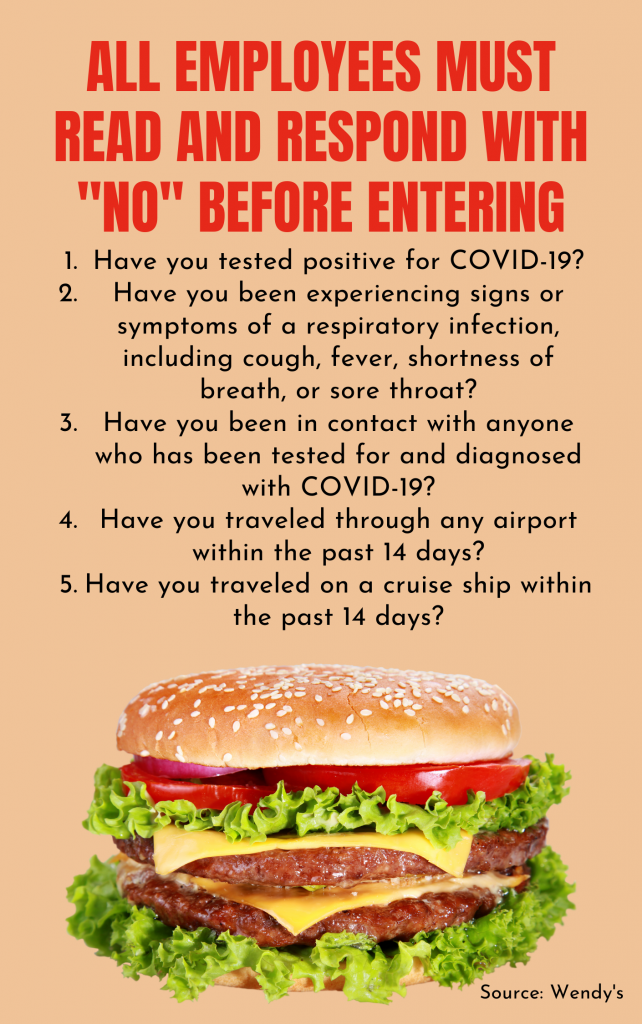As COVID-19 continues its exponential growth, fast food workers have been named “essential workers,” alongside doctors and government officials. Among those personnel is Randy Stewart, district manager of Wendy’s through Meritage Hospitality Group in Jacksonville, Florida.
Although the nation’s economy is a big concern, Stewart said, “people are what matter when you’re trying to keep a restaurant operating,” especially during this pandemic.
“It’s all about people—feeding people, giving a job to people, and keeping people safe,” Stewart said.
That’s the secret to running a good restaurant—something Stewart has learned from years of experience in the business, and it’s also proven to be the secret to keeping a fast food business afloat, when one case of COVID-19 holds the potential to shut an entire location down.
Why It’s Newsworthy: Access to food is a priority for all amid the COVID-19 pandemic, pushing some restaurants to adapt to solely drive-thru and pick up while forcing the rest to close operations until further notice.
Good People Mean Good Numbers
“No matter what type of business it is, the profit-and-loss statement is just a story about people. If you have the right people with the right leadership doing the right activity, there will be a number of areas in which you’re going to be successful,” Stewart said. “People are going to treat each other correctly, and you’ll have that environment where people really want to do well.”
That’s where Stewart comes in as district manager. He sees his role as a coach, making sure his people have the tools to grow and make an impact in their work environment.
This philosophy has translated well in his work with Wendy’s, especially amid the COVID-19 outbreak, where businesses and government officials have been critiqued for putting money before people’s wellbeing.
Stewart takes pride that Wendy’s has “been able to keep pretty much everyone working in operations,” something that has given him a new appreciation for the fast food industry, too.
“Knowing that ‘Hey, we’re not just a quick bite for somebody,’ but it is really able to help someone feed their family, or help someone feed themselves in these strange times,” he said. “It’s also the pride of being able to keep as many people employed as possible so they can take care of their family.”
According to the National Restaurant Association, 1,096,000 Floridians and 488,400 Georgians worked in the restaurant industry in 2019, making up 12% of Florida’s and 11% of Georgia’s workforce. And that number wasn’t predicted to go down in 2020. COVID-19 changed things.
Expertise and Guidelines
On March 16, the White House released President Trump’s Coronavirus Guidelines for America, which advised, “avoid eating or drinking at bars, restaurants, and food courts—use drive-thru, pickup, or delivery options.”
While several local and state officials had taken measures to shut down dine-in options already, the national guidelines sealed the deal. On March 20, Florida Gov. DeSantis followed suit and issued Executive Order 20-71 to shut down dine-in service.
This pandemic could very well permanently change the restaurant industry, Stewart said, with the number of restaurants coming out of the national shutdown still operating at a low level.
“I don’t know where we’re going to be with the restaurant industry in the future,” Stewart said. “The casual dining restaurants have taken a hard hit because they’re not doing a lot to go or delivery, or not set up for the drive-thru.”
https://www.canva.com/design/DAD6T1M8gTI/view
Right now, running errands from the comfort of a car seems like the solution for industries other than restaurants, with multiple drive-thru testing sites for COVID-19 popping up in several states.
“I think there will be a number of people whose view on being in a crowd will be changed forever, so people going to eat at a sit-down restaurant, going to the movies or other things like that are all going to be viewed differently from now on,” Stewart said.
Aside from closure of dine-in service, restaurants that are still in operation, such as Wendy’s, have looked to public health experts and local officials for pandemic protocol.
The Center for Disease Control and Prevention provides national guidelines on how to stop the spread of coronavirus. Part of their suggested protocol includes to “actively encourage sick employees to stay home” in order to reduce inter-employee COVID-19 contamination.
Gov. Desantis’ Executive Order 20-68, issued on March 17, encompasses these guidelines, requiring that restaurants conduct employee screenings prior to their shifts.
In addition to these measures, Wendy’s also requires cashiers to wear gloves, something that has not been required of them by the state of Florida; however, while there are new precautions being taken to avoid contamination, Stewart said that they’re heightening what’s normally expected of them in a restaurant.
“Part of the mentality is that we have to be food safe and food-safety trained, so we’re already used to having requirements on how to operate and keep people safe, so this is just enhanced,” he said.
The National Restaurant Association has released information to the public, stating that restaurants have food safety practices in place, which includes ServSafe guidelines, but that “owners and operators should contact their state and local health departments for the latest advisories/information about coronavirus in their community.”
Drive-Thrus, Part of the Solution
For Wendy’s and other fast food restaurants, drive-thrus are the only thing keeping them open.
“We were already trained in how to package things that way and be efficient in that way, but it has become more valuable to be able to have a food source that you don’t have to get out of your car for,” Stewart said. “You can come through and get food for your family that’s prepared.”
Wendy’s has started to run deals to help feed families. On April 20, they launched a family meal deal, which includes four sandwiches and four orders of fries at different price points – $10, $15, and $20 – saving families money and making it easier to order.
For $10 and $15, families can choose between sandwich options, valued at different prices on the Wendy’s menu. For $20, there’s a choice of sandwiches accompanied by four fountain drinks.
“A lot of times with big orders—like if you’ve got four people ordering four different items with all kinds of different stuff going with it—it takes longer to get them through the drive-thru line,” Stewart said, “so having the family meal deals and price points that can hit different desires helps the families with the money, and it helps us with being able to execute it.”
Stewart also pointed to the benefit on a larger social level, too, saying that drive-thrus can serve as a place for people to interact with other people right now, from the safety of their cars.
“The value of the fast food worker as being an essential worker has taken on a new meaning that I am proud to be a part of, and at the same time,” he said, “I’m glad that we’re able to provide food to so many people and an opportunity for people to get out.”
With cars serving as a safe place from the virus for many, this four-wheeled solution only goes so far. While it’s not perfect, it’s something.
On one hand, customers can affordably feed their families from the safety of their car, and on the other hand, employees can earn a living to feed their families. A bonus is that little slice of social interaction, even if it’s through a drive-thru window that day.
Disclosure: The main source in this article is a relative of Grady Capstone journalist, Mary Margaret Stewart. Stewart is a senior majoring in Spanish in Franklin College of Arts and Sciences and journalism in the Grady College of Journalism and Mass Communication at the University of Georgia.








Show Comments (0)